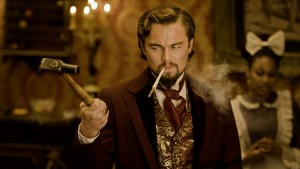The sequence in Django Unchained that jumped out at me the second time around is, perhaps unsurprisingly, the most frenetic sequence in the film. (Spoilers after the jump.)
 If you’ve seen the film, you remember the sequence well: Django (Jamie Foxx) and Dr. King Schultz (Christoph Waltz) have been bested by head house slave Stephen (Samuel L. Jackson) and his vicious owner, Calvin Candie (Leonardo DiCaprio) in their gambit to purchase the freedom of Django’s wife, Hildy (Kerry Washington). Schultz, suffering from a form of PTSD, endures agonizing flashbacks to the scene in which a slave is torn limb from limb by a pack of dogs while he waits to conclude his business with Candie. Blood gushes and entrails stream from the tortured slave’s belly; his screams and the snarling dogs jarringly interrupt a harpist playing lovely lovely Ludwig Van in the parlor in which Schultz stews.
If you’ve seen the film, you remember the sequence well: Django (Jamie Foxx) and Dr. King Schultz (Christoph Waltz) have been bested by head house slave Stephen (Samuel L. Jackson) and his vicious owner, Calvin Candie (Leonardo DiCaprio) in their gambit to purchase the freedom of Django’s wife, Hildy (Kerry Washington). Schultz, suffering from a form of PTSD, endures agonizing flashbacks to the scene in which a slave is torn limb from limb by a pack of dogs while he waits to conclude his business with Candie. Blood gushes and entrails stream from the tortured slave’s belly; his screams and the snarling dogs jarringly interrupt a harpist playing lovely lovely Ludwig Van in the parlor in which Schultz stews.
That Schultz’s flashbacks—and his refusal to shake Candie’s hand to conclude their business—take place next to, and then within, the house’s library is no accident. Waltz, who opposes slavery even if he is not an outright abolitionist at the film’s beginning, is tormented by the images he has seen. Like so many northerners exposed to the horrors of slavery through tales of escaped slaves and books like Uncle Tom’s Cabin, Schultz has been radicalized. He knows that Candie has him over a barrel, but the faux-gentility of the South—the parlors filled with white cake and harpists built on horrible suffering—disgusts him. He will not play their game.
This is why, when Candie demands to shake his hand, Schultz at first demurs, and then murders, the Mandingo-fighting owner of Candyland Plantation. Schultz may be able to turn a blind eye. But he will not, even implicitly, give this preening monster the satisfaction he so desires.
After firing the proverbial first shot, true war breaks out. Django grabs a pair of guns and goes to town, gunning down a dozen or so Southerners as he tries to shoot his way out of Candyland. What’s remarkable about the shootout that follows isn’t necessarily the buckets of blood but the sound design. As the scene is shot in slo-mo, the whine of the bullets also slows. But, if you listen carefully, you realize you’re hearing not rifle shots but cannon fire. We may be seeing bullets but we’re hearing artillery—and seeing it too, if you think about it. Because those buckets of blood that splash up every time a bullet smashes into the corpse behind which Django has taken cover resemble not blood so much as land, churning, splashing up when a shell lands, leaving craters in their wake.
Men scream as lead rips through their flesh like a dog’s teeth through a slave’s belly, but there is no sadness here, no glorious lost cause. This is retribution for the South’s original sin, rendered harshly. The war has come to Candyland one year before it came to the rest of the Confederacy.
There will be no survivors.
{ 3 comments… read them below or add one }
Seems kind of significant that Django is completely peripheral to the film’s most riveting scene. It’s hard to make a great movie when your main character is basically a cypher.
Here’s an argument-starter: King Schultz, and not Django Unchained, is actually the film’s primary character. He almost certainly has more lines despite probably 30 minutes less screen time. He is the one who initiates all of their plans. He is the one who does all the talking. He is the one who sets the film’s action into motion.
Django may be the titular character. But it’s protagonist is Dr. King Schultz.
Weirdly enough, I did not like Schultz’s character as much as everyone else did. First, he loses his nerve at Candyland after his plan fails. Second, it’s hard to square his gleefully amoral antics at the beginning of the film with his shocked reaction to life on a Mississippi plantation in the latter half. And third, shooting a guy and then presenting a warrant with the expectation of escaping all consequences is just stupid, even in the context of Tarantino’s cartoonish re imagining of the antebellum South. I mean, do we really think that people in this ultra-violent frontier society are just going to dumbly accept the validity of Schultz’s warrant and his assurances that he shot the right guy?
I thought Stephen stole the show in Django. I would totally watch a movie about him becoming the power behind the throne at Candyland.